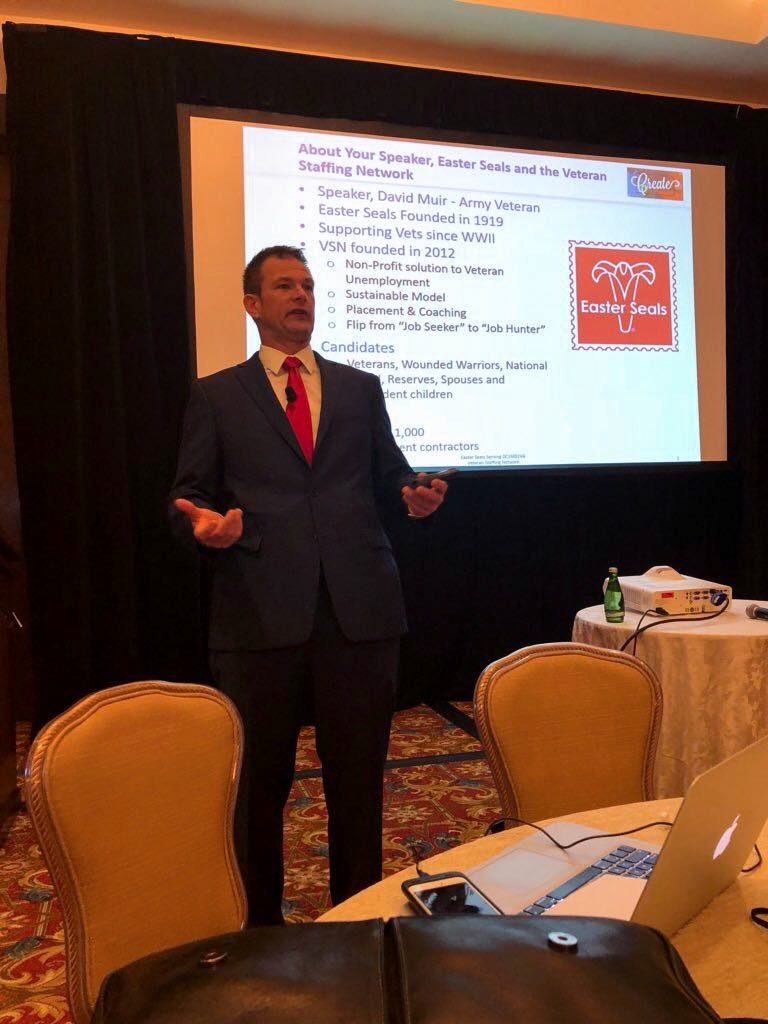While veteran unemployment is often a hot topic in the HR world, and thankfully on the decline, veteran underemployment is still a major issue–and one that isn’t often discussed. What does that mean exactly? An underemployed veteran is a veteran who has accepted a job that is below their job skill and experience, in order to make a living. Last month our Strategic Partnerships & Alliances Specialist, Mikey Meagher, had the pleasure of sitting down with David Muir of Easterseals Veteran Staffing Network to discuss this very topic in the second episode of our DE Talk podcast. David is a former, award-winning Army Corporal who has spent more than a decade in the staffing world, particularly in job training for transitioning military servicemen and women. Take a look at these key highlights and be sure to listen to the podcast in its entirety to hear more about how he works with both employers and job seekers to help veterans find meaningful employment.
Mikey:
As many veterans have transitioned out of the military, they often struggle with where to go next and that whole question of, “What skills do I actually have,” comes into play. So, can you talk a little bit about your transition from the military and possibly any apprenticeship programs that you took to start your career?

David Muir presenting at DirectEmployers 2018 Annual Meeting & Conference (DEAM18) in Seattle, Washington.
David:
So, I was in college while I was serving in the National Guard. My transition out, I thought I was just kind of done with the military and wasn’t going to be something that I needed. What I was studying in school didn’t work out and I had a very lost feeling. I was no longer a soldier, I was no longer going to be a teacher, and I came across a culinary apprenticeship and ultimately that led me to have an almost 15 year career in the restaurant industry.
But the reason the apprenticeship really resonated with me was it was a structured training program that had a definitive end date, it had standards of excellence that needed to be achieved over time. And I think when you look at that type of a framework, it’s very similar to what the military puts in place. There are roles, responsibilities of duties to being in the military regardless of branch or what your job category is, and each of those standards needs to be met and they need to be met with an exceptional level of commitment and performance for a variety of reasons. If people do things wrong in the military, it could cost lives, and so it’s important to take your job very seriously.
And so, that modality of learning how to become a soldier and learning how to train to become a soldier fit very well with an apprenticeship process and as the years have gone by, we’re definitely seeing an increase in the number of apprenticeships that are out there to help develop the workforce of the future. And you’re seeing a lot of people coming out of the military who are taking advantage of the apprenticeships and really getting into some great opportunities.
Mikey:
And what did you learn as a veteran job seeker turned staffing professional that you can share with employers who are trying to actively recruit veteran talent?
David:
There’s a couple of key things. One is there’s a difference in the mindset of joining the military and training to become a service member versus a civilian employer. And what I mean by that is in the military they hire for ability and they train for the job, right? They do a complete assessment of who this person is when they join the military and then they say, “This person would be good for these types of jobs,” and then they train that person. I didn’t know how to fire a rifle or shoot a machine gun before I joined the Army. They taught me how to do that.
With the civilian workforce, training is expensive. And so finding somebody and making an investment in training on a new hire is scary. And so, employers are looking for someone who can “hit the ground running” and not every veteran has those skills walking in the door, but they are capable of training. You can hear a service member frequently say, “Well, just tell me what you want me to do, show me how to do it and I’ll get it done,” and that is the mindset that they’re ingrained with. So there’s that chasm to overcome.
And then I would say that the second biggest thing that I’ve come to learn through my career as far as the difference between somebody from the military and the civilian workforce is accomplishments, right? So, if I’m interviewing with you and all I do is talk about my team because there’s no individual in the military, everybody does it as a unit or a squad or a division or a fleet, and so that’s the mindset that that service member, that veteran candidate is now thinking. And the reality is, that if you’re interviewing me, you don’t care what my unit, squad, fleet, division did. You want to know what I did. What was my individual accomplishment because if I can accomplish things somewhere else, I can more than likely accomplish things for you as your employee.
Mikey:
Those are some great examples and I’m sure a lot of employers will definitely take them into consideration when interviewing future veteran employees.
There’s no doubt that David is passionate about what he does! He also recently hosted a webinar for us and it remains one of our highest rated sessions to date, so be sure to watch Attract, Evaluate, Onboard and Retain Military Talent after listening to the full podcast!
